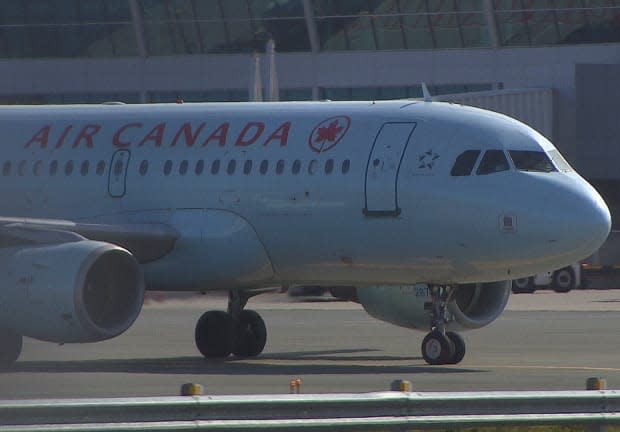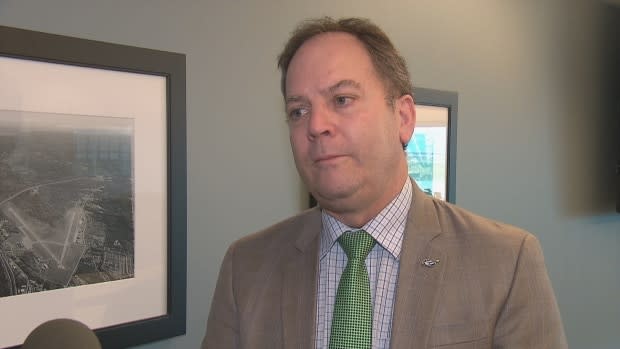Regional airports desperate for federal aid amid 'toughest months ever'
Airports in Atlantic Canada are hopeful a brief mention in this week's throne speech could signal federal support is on the way as the latest numbers illustrate a dire situation for the industry in the region.
The Atlantic Canada Airports Association, which represents 11 airports in the region, reported this week that passenger levels remain a fraction of what they were before the onset of COVID-19 and subsequent travel restrictions in the Atlantic bubble.
Karl Moore, an airline industry expert and professor at McGill University, said the long-term outlook doesn't look good, either, with global aviation organizations forecasting a return to regular traffic in 2024.
The situation could jeopardize the long-term future of some airline routes to the East Coast, he said

"There's no point flying down, spending the money, polluting the air if there's no one on the flight," Moore said.
"If people are unable or unwilling to travel because of government restrictions or health or whatever reasons they have, that means those flights aren't going to be flown because it's not going to make sense economically."
Derek Stanford, the Atlantic Canada Airports Association president and CEO of the Saint John Airport, said airport officials have been lobbying the federal government for financial assistance as the recovery timeline continues to be pushed back.
"While we are critical infrastructure, we certainly aren't treated that way," Stanford said.
The Saint John Airport is down to a single passenger flight per day, to Montreal, and he said there are few options to cut costs and remain compliant with aviation standards and open for essential services, such as medevac flights. The airport has already laid off 40 per cent of its workforce and scrapped capital project plans.
Now, after the "toughest months ever," he wants to see government intervention.
"You can have uber strict border policies, but it doesn't mean you can have airports operating at full capacity. It's not the post office," he said. "We're not a utility that's always there, always on."

The federal Liberal government's throne speech said Ottawa will work to support regional routes, many of which have been suspended in Atlantic Canada.
"It is essential that Canadians have access to reliable and affordable regional air services," the speech said. "This is an issue of equity, of jobs, and of economic development."
What that support will look like is unclear at the moment, but Stanford's association has pitched solutions such as federal grants or forgivable loans, expanding assistance programs for other infrastructure to airports, or waiving the rent fees airports pay to the government.
He said the situation for the industry is unsustainable, with airports facing multimillion-dollar losses this year and left relying on cash reserves and lines of credit to remain afloat.
Airlines also keen for help
Moore said airlines are also looking to Ottawa. They need to see an increase in traffic demand so they can at least break even or they need some kind of financial aid package.
Otherwise, he said, it doesn't make economic sense to fly to Atlantic Canada. Earlier this year, Air Canada suspended indefinitely 14 routes in the region and closed its stations at the Bathurst and Wabush, N.L., airports.
"It's something where it does put at risk, to some degree, the future of airline travel between Atlantic Canada and the rest of the country and, indeed, globally," Moore said.

Moore said the restrictions around the Atlantic bubble, which require non-essential travellers to self-isolate for 14 days upon arrival, pose an extra barrier for the industry in the region.
He travelled to teach in Iceland during the pandemic and was told he couldn't meet more than 10 people for the first five days of his trip. He was, however, permitted to drive around and sightsee.
"It's an opportunity that is absolutely causing economic difficulties in Atlantic Canada … but, then again, it might be the best thing to do from a health-care viewpoint," Moore said.
With cases climbing in other provinces this week, new cases in each Atlantic province remain in the single digits in the past seven days.
The Atlantic Canada Airports Association projected in a release this week that its 11 airports will see a drop of 5.5 million passengers this year compared with 2019, resulting in a net loss of $76 million across the region.
"Summer results are in," executive director Monette Pasher said in the release. "What is normally a period in which airports depend to boost revenues for the entire year saw passenger traffic down 89 per cent and 87 per cent respectively in July and August in comparison to 2019."
A new route
Bernard LeBlanc, CEO of the Greater Moncton Roméo LeBlanc International Airport, said the airport saw a slight bump in passengers during the summer months after losing 98 per cent of traffic in the spring.
However, he said Monton is nowhere close to normal levels — the airport is running four flights daily compared with the usual 15 to 20 — and further growth is limited.
"With the travel restrictions in New Brunswick and Atlantic Canada, it's very limited how much more growth we could see or how airline capacity we see coming in because it's very restricted in terms of who can travel and who's required to quarantine if they travel," LeBlanc said.
Part of that recent growth can be attributed to the new PAL Airlines route between Moncton and St. John's, a route that hadn't been active since 2006.
LeBlanc said the airline and airport saw an opportunity after Air Canada cancelled all routes between Halifax and airports in New Brunswick and Prince Edward Island, meaning the only option to fly to St. John's was driving through Halifax or detouring through Toronto or Montreal.

That bit of positivity is shrouded in an uncertain future for the airport, which is facing a $7-million loss this year, LeBlanc said.
The airport is not a designated international airport during the pandemic and will miss out on the roughly 50,000 passengers who travel from Monton to sunny, southern destinations annually — a service that likely won't resume until 2024, he said.
"As we get deeper and deeper into this pandemic, if things don't improve, if things don't change, if the revenue streams don't start, the only way you can reduce more is to do less," LeBlanc said.
"So doing less could be, 'Do we need two runways when we can only afford one runway? Do we need four taxiways or could we operate with two? Do we need to [use] all our parking lots or just a portion of that?'
"I think what could happen if things don't get better or worse down the line, we will have to look at reducing the level of activity that we do in line with what the requirements are."


